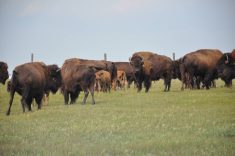CALGARY – A little-understood parasite is causing four to 10 abortions per month in British Columbia dairy cows.
Neospora, a one-celled protozoa, was first detected in California where it caused a 10 to 20 percent abortion rate in herds. The condition showed up a few years ago in B.C. A few cases have been diagnosed in Alberta, mostly in central region dairy herds, said an agriculture department official.
To date, most reported cases have come from B.C.’s Fraser Valley, which has a large dairy population, but a case was diagnosed in a beef animal at Ft. St. John, said Ron Lewis. He is a provincial veterinarian with the provincial animal health centre in Abbotsford, where animal diseases are diagnosed.
Read Also

Canadian Food Inspection Agency slammed for handling of bovine tuberculosis case
The federal government leans heavily on producers to “take one for the team” and risk their livelihoods without any reassurance of support.
“Right now it’s probably the most common identified cause of abortion that we have right now in B.C.,” said Lewis.
Scientists have been unable to discover how the disease is transmitted or determine its outward symptoms. A study on herds in the Lower Mainland of B.C. was initiated in late 1994 to learn how it is caused, how it spreads and how to prevent it.
The parasite causes cattle to abort calves in the last trimester of pregnancy. When a farmer finds the fetus, there are no discernible symptoms. Only under the microscope have scientists detected the one-celled par-asite in brain tissue and changes in other internal organs.
Neospora behaves like coccidia, microscopic parasites that live in the intestines. Researchers suspect if neospora is similar to coccidia it may start in the intestinal tract of a carnivore like a dog or cat.
“The host might shed the eggs and the cow would probably pick it up while it’s grazing…,” said Lewis.
There is also a chance the parasite is similar to toxoplasmosis which can affect pregnant women who handle cat feces and cause abortion or birth defects.
“It’s not the same, but it’s a similar parasite so we suspect that the life cycle is probably similar as well,” said Lewis.
The disease isn’t likely new, but improved detection methods have made neospora diagnosis more common.
There is no vaccine available.
The cows don’t develop an immunity once they’ve lost a calf, however future fertility doesn’t seem to be affected.















